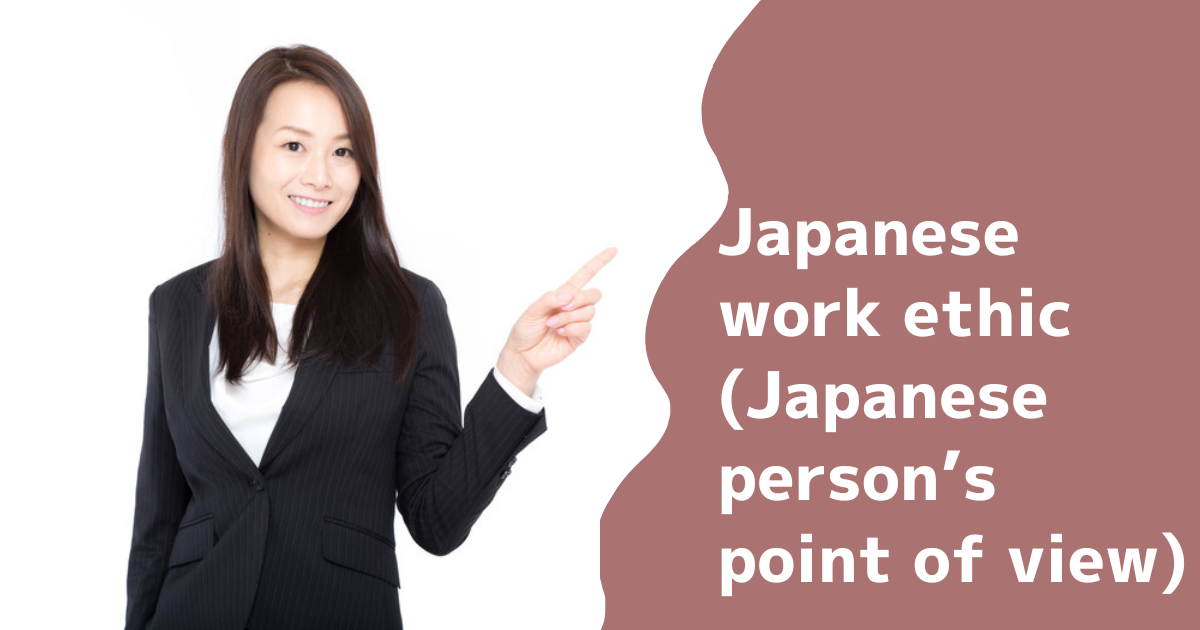When you have possibility to interact with Japanese people such as entering a Japanese based company, doing business with Japanese partners, you might be wondering why Japanese people are working so hard.
You possibly feel you are worried about working in Japanese based company with Japanese people’s pressure to work hard
or feel quite difficult to catch up with Japanese people’s work style when doing business with them.
Yes Japanese people are hard working comparing other counties people and have loyalty to their belonging companies.
If you understand Japanese work ethic, you possibly can well know how to interact with Japanese people and have successful business relationship with them.
In this article I’d like to explain Japanese people’s work ethic, actual work environment and how to get along with them, etc.

Let me introduce about myself.
I am Hiro from Tokyo, Japan, born and raised here.
I have working experience in Japanese companies (logistics and manufacturing) as an international sales for almost 10 years, so I well understand Japanese people’s business practice.
Japanese people’s work ethic

You might imagine Japanese people have below business practice.
- Be extremely punctual
- Overwork even on holiday
- Take less annual leave
- Never allow mistake/failure
You are almost right. Usually Japanese people are industrious and have strict work ethic and I consider it comes from each Japanese company culture.
Japanese company culture

I consider Japanese people’s hard working ethic is coming from Japanese company culture.
Traditionally, Japanese companies require employees to have loyalty to company, instead, the companies usually provide employees education and life time work environment till retirement.
Company provides education
When entering a Japanese company, the company provides you education and there are a lot of opportunities to attend seminars and workshops
and the new employees usually don’t be in charge of anything important operation for first 1 or 2 years and just be assistant during that period.
When they are well trained and get used to work environment then they gradually get in charge of important work.
When I first entered logistics company after graduation of university the company provide us education of logistics knowledge and how to be appropriate sales for half a year and latter half a year I accompanied visiting customers with my seniors or supervisors to learn communication skill with customers and then I officially became sales in the second year.
Life time employment is usually assured
Also if you once enter a Japanese company, you usually never get fired unless you make any massive loss in belonging company or your company is bankrupted
and life time employment till retirement is kind of assured.
(I am talking about tendencies and there are a lot of exceptions.)
Also salary is increasing according to years employees work.
My current belonging manufacturing company have also never fired an employee due to bad sales result, Just several cases of resignation such as driving a company car after drinking alcohol and made accidents.
Due to above reasons we Japanese workers are well trained and protected by company and instead the companies require loyalty to employees.
Actual work environment

Since Japanese companies require loyalty to employees, it creates distinctive company culture such as follows.
Work long hours
Japanese companies usually have long working environment even after regular working hours such as overtime work or holiday work
because the number of workers in one company cannot be increased or decreased easily depending on sales performance in company, so usually one worker must owe wide range of tasks and then they end up work long hours. (Company cannot increase workers in temporary basis)
Need to help other workers finish work
Furthermore, some companies supervisors/seniors won’t allow subordinates to finish work until they finish work. (It depends on company culture though)
When I was in a logistic company in Japan and when I finished my work after regular working hour I must ask my supervisor or seniors whether I could help their work to be finished.
The asking was part of the company culture and as a result all the workers couldn’t finish work till about 8pm even though regular working hour was till 5:30pm.
Overtime work is not reflected to salary
Moreover, some of the company require workers overtime work or holiday work without paying additionally for the commitment.
When I was in the logistic company a lot of workers was forced not to register overtime work in company system but still employees worked until 8pm (regular working hour was till 5:30pm).
Nowadays such kind of illegal work environment is decreasing due to Japanese government regulations and company get instructed or punished if such terrible work conditions continue, but still that culture is still existing in some companies.
Be careful to “black company” in Japan
Some bad Japanese companies (we call it black company) take advantage of employees loyalty to company and try to minimize their internal cost by exploiting workers.
If you wish to work in Japan and don’t want overtime work environment, you should check job posting information and also internet reputations of each company carefully.
There are a lot of good companies which are employee friendly (We call it white company) recently and I hope you find some of them suited for you.
Be obedient to supervisor

We must be obedient to supervisor in distinctive way.
Not easily refuse supervisors requirement
We cannot easily refuse supervisor’s requirement of tasks even if its too hard.
This is part of Japanese people’s tendency as well and we cannot directly reject anything otherwise you receive negative impression from supervisors.
In a manufacturing company which I belong to, my supervisor sometimes require me finishing some task within a day which causes overtime work. (He sometimes give me a task when it is about to be end of working hours)
Even if I have another appointment with my friends to have dinner, I had to tell them I would be late.
Work seriously even without supervisor in office
We Japanese people are seriously working even without supervisors in office and we are quiet whole day there.
One foreign staff who was temporarily working in our Tokyo headquarter office was surprised how quiet the office in Tokyo were even without supervisors.
It seems our branch in another country was rather lively when supervisors were not there.
When we really want to speak any private matters with my colleagues, we usually use chat messages such as Microsoft teams or line instead, even though they sit near to me.
Work for many years

In Japanese companies there are a lot of workers who are working more than 10-20 years.
First reason is that a lot of Japanese companies assure life time employment till retirement as I mentioned.
Patience is kind of virtue in Japan
The second reason is that Japanese people consider patience is important while working.
There is old way of saying in Japan “Sit on a stone for 3 years” which means even if working itself is painful you have to be patient at least 3 years
In Japanese people’s mind it could be better continuously working even if working environment is not good. For example you get scolded by supervisor often or you work overtime everyday,
so Japanese people won’t quit job easily even though working environment is terrible.
We somehow believe that working more than 3 years. then you can gradually be professional in a certain field.
Seniority wage system
Furthermore, income level is getting higher if you work many years in Japan.
Income level is slightly based on sales performance of each year as well but long years workers usually receive more income comparing to good sales performance workers who started working less than 3 years.
Thus, there are usually many long year working employees (more than 10 years) in Japanese companies.
Take less annual leave

Japanese people tend to take less annual leaves.
Based on pole done by travel agent Expedia, annual leave usage in Japan was round 50% till 2020 and more than half of the annual leaves left was not fully used..
In Japanese working place, taking annual leave is considered to be negative thing and we have kind of guilty of taking annual leave in our mind and even there were some workers who bring souvenirs to give to other workers to say thank you for letting them take annual leave.
We all forget taking annual leave was kind of employees rights.
From 2019, Japanese government started regulation that all the Japanese companies must let employees have at least 5 times annual leave per year, otherwise the companies get punished.
Hopefully situation has been improving.
Be punctual
Japanese people are extremely punctual while working.
When there is a meeting, a lot of workers prepare 5 minutes before meeting starts and everybody is ready to start the meeting on time.
If you need to delay 1 or 2 minutes, we usually inform supervisor in advance otherwise we get blamed for the delay or lose trust.
Supervisor/customer’s tasks has to be finished completely before due date
Finishing a task which your supervisor/customer asked you to finish is the same.
You have to submit perfect version of assignments till the due date if your supervisor/customer asked you to finish, which means that you need to submit draft assignments 1 or 2 days before the deadline, get advised once, and then re-submit perfect assignments to them before the due date.
Otherwise your supervisor/customer gets upset and disappointed in you bringing incomplete version of assignments in the due date.
I consider that we Japanese have really strict time concept.
How should you do business with Japanese people?

I explained Japanese people’s work ethic and then I guess you might feel quite negative working with them.
However, don’t worry about it too much because, when Japanese people work with other countries people they are also struggling to how to cope with foreign people and know Japanese work culture is not global standard,
but you can also understand that Japanese people have such strict work ethic
and you can try a little close to have similar work style with them such as keeping punctual when you have chance to make an appointment with them or submitting proposal in their time schedule, and then I believe you gradually get trusted by them.
How should you work in Japan

If you plan to work in Japan and you are worried about working in Japan.
You can firstly consider working in foreign based company in Japan.
The culture of foreign based companies is different from Japanese based one and you don’t need to consider the way Japanese people work too much.
Of course there are a lot of types of foreign based companies in Japan and some of them are quite similar to Japanese companies, so you need to carefully check company culture during interview or through internet information.
Also, if you are thinking of entering 100% Japanese based company, as I recommended, you need to carefully check job posting and internet information. (Some job posting describes monthly average over time work, annual leave usage ratio, resignation ratio and those information could be keys to check whether it is good company or not.)
There are a lot of employee friendly companies in Japan with good environment as well and I hope you try to find one which suits you best.
Conclusion
In this article, I explained Japanese work ethic and how to get a long with Japanese people in business.
I hope you read it and understand Japanese people way of thinking and be successful relationship with them.
Thank you for reading my article till the end.



コメント Comment